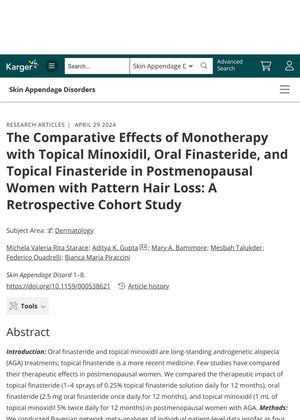Comparative Effects of Monotherapy with Topical Minoxidil, Oral Finasteride, and Topical Finasteride in Postmenopausal Women with Pattern Hair Loss: A Retrospective Cohort Study
January 2024
in “
Skin appendage disorders
”

TLDR Oral finasteride seems more effective for hair loss in postmenopausal women, but more research is needed.
The study compared the effectiveness of topical finasteride, oral finasteride, and topical minoxidil in treating pattern hair loss in postmenopausal women. The treatments were administered for 12 months and their impact was evaluated based on changes in total hair density, hair diameter, clinical photographs, and patients' opinion of efficacy. The results showed that oral finasteride was ranked as the most effective treatment across all four outcomes, while topical finasteride was the least effective. However, no significant statistical differences were found between the treatments. The study concluded that while oral finasteride appears to be more effective than the topical forms of minoxidil and finasteride, more research is needed to confirm this result.











